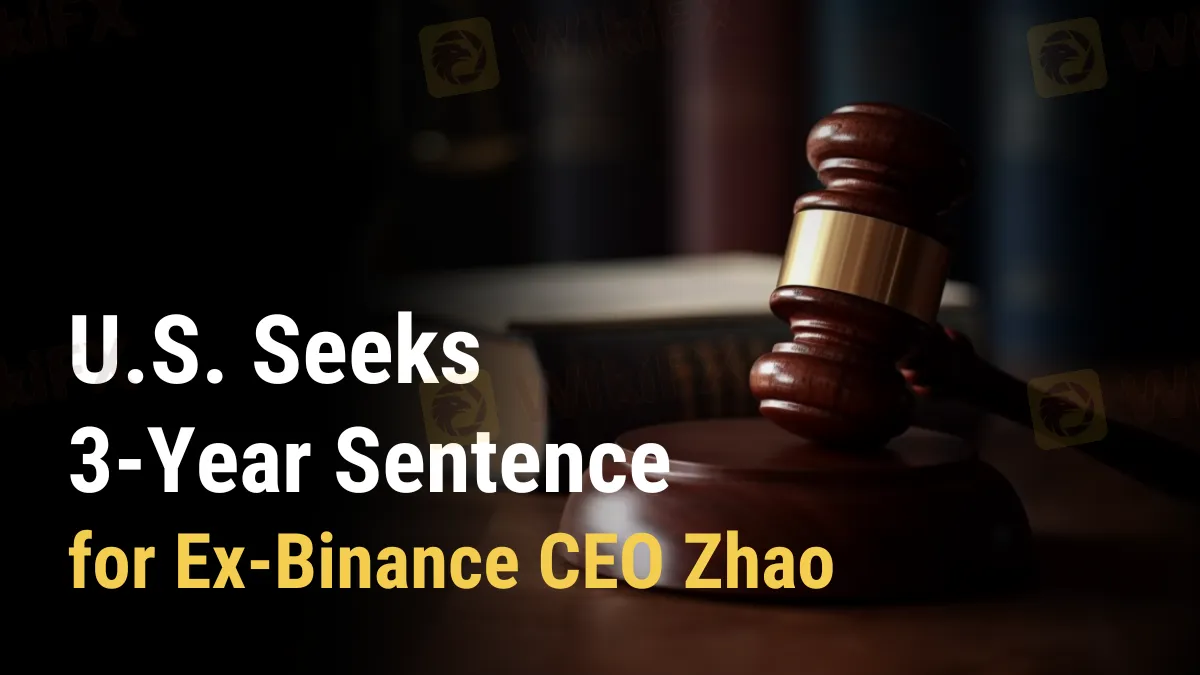简体中文
繁體中文
English
Pусский
日本語
ภาษาไทย
Tiếng Việt
Bahasa Indonesia
Español
हिन्दी
Filippiiniläinen
Français
Deutsch
Português
Türkçe
한국어
العربية
U.S. Seeks 3-Year Sentence for Ex-Binance CEO Zhao
Abstract:Former Binance CEO faces a potential 36-month sentence in the U.S. for money laundering. Prosecutors cite the gravity of crimes and the need for deterrence.

Changpeng Zhao, the former CEO of the renowned cryptocurrency exchange Binance, is being pressured by U.S. prosecutors to serve a 36-month prison term. This action was prompted by a sentencing letter received late Tuesday by the western district of Washington, which detailed the charges of money laundering facilitation.
According to the memorandum, Zhao's conduct warrants a sentence greater than the advisory standards, which normally vary from 12 to 18 months. A 36-month sentence, according to the prosecution, would accomplish the sentencing objectives without being too punitive, maintain respect for the law, highlight the gravity of the conduct, and discourage similar offenses in the future.
The Bank Secrecy Act requires Zhao to develop a successful anti-money laundering program, which he allegedly failed to do. He is also claimed to have allowed Binance to handle transactions with illicit proceeds, particularly those involving Americans and others from embargoed nations.

The Commodity Futures Trading Commission and the SEC have filed complaints against Binance, which has been in legal conflicts. These fines followed allegations of illegally operating an unlicensed U.S. exchange and unscrupulous customer asset management. Zhao agreed to pay $50 million, while Binance was fined $4.3 billion.
Following the plea deal, Zhao resigned as CEO of Binance in November, and Richard Teng took over. Inquiries were made to Zhao and Binance, but they did not respond.
Zhao's actions, according to the prosecution, indicate an “unprecedented scale” of financial crime, and they denounce his apparent disregard for the law. They believe Zhao oversaw Binance's risky actions, which were reminiscent of the “Wild West,” with Zhao wagering on avoiding detection and suffering as few consequences as possible.
But now that Zhao is in legal hot water, the court will decide what punishments are fitting for his behavior. The court will consider Zhao's misdeeds and the necessity of deterrence in the cryptocurrency industry when determining his formal sentence on April 30.
In summary, Zhao's 36-month sentence shows how seriously authorities take financial crimes against the Bitcoin industry. The legal obligations that CEOs of bitcoin exchanges have been brought to light by this case, as are the consequences of discharging these obligations.

Disclaimer:
The views in this article only represent the author's personal views, and do not constitute investment advice on this platform. This platform does not guarantee the accuracy, completeness and timeliness of the information in the article, and will not be liable for any loss caused by the use of or reliance on the information in the article.
Read more

Why the SEC Rejected the First U.S. Bank-Issued Stablecoin
The SEC rejected the first U.S. bank-issued stablecoin, citing regulatory concerns. This decision highlights the ongoing challenges in crypto asset classification and oversight.

IG Group Acquires Freetrade for £160M to Expand UK Investment Market
IG Group acquires Freetrade for £160M, boosting its UK investment offerings. Freetrade to operate independently, with plans for growth and innovation.

UK Authorities Freeze Nearly $7.7 Million in Illicit Crypto Assets Within a Year
Crypto wallets tied to fraud and tax evasion were frozen under new enforcement powers granted in 2024.

Webull Launches SMSF Investment Platform with Zero Fees
Webull introduces commission-free SMSF trading, offering over 3,500 US and Australian ETFs, with no brokerage fees and enhanced portfolio tools.
WikiFX Broker
Latest News
FCA Warns Against 10 Unlicensed or Clone Firms
CySEC Warns Against 14 Unlicensed Investment Websites
Top Currency Pairs to Watch for Profit This Week - March 31, 2025
Will natural disasters have an impact on the forex market?
Philippines Deports 29 Indonesians Linked to Online Scam Syndicate in Manila
Exposing the Top 5 Scam Brokers of March 2025: A Closer Look by WikiFX
Gold Prices Climb Again – Have Investors Seized the Opportunity?
Webull Launches SMSF Investment Platform with Zero Fees
Australian Regulator Warns of Money Laundering and Fraud Risks in Crypto ATMs
AI-Powered Strategies to Improve Profits in Forex Trading
Currency Calculator







